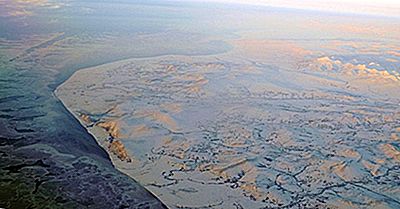The United States and Russia are separated by a waterway in the Pacific Ocean known as the Bering Strait. At its narrowest point, the Strait separates the State of Alaska from the United States and the island of Chukotka by the miles 51. A part of the strait freezes in winter, which makes it possible to cross the strait. The strait is relatively shallow, with a depth varying between 98 and 160 feet. The easternmost point of Asia and the westernmost point of North America are found in the strait , namely Cape Dezhnev and Cape Prince of Wales, respectively. Due to its remoteness and freezing temperatures, the region is sparsely populated. The largest settlement is the town of Nome, Alaska, which is home to 3,800 residents. Lavrentiya is the largest city on the Russian side of the strait, which has about 1,460 residents. The Strait is crossed by the International Date Line, which crosses the Diomede Islands, which means that Big Diomede Island and Little Diomede Island operate on different dates.
The Cold War
The Strait was heavily patrolled during the Cold War because it marked the international border between the two countries involved in the conflict. Residents of the Diomedes Islands, located on the border, crossed the border for many years for commercial and cultural purposes. However, the border was completely closed during the Cold War and cross-border movements were considered illegal. The border, also known as the “ice curtain,” was finally opened after the collapse of the Soviet Union in the late 12th century, and limited cross-border movement in the Bering Strait resumed.
The land bridge
The origin of the Paleo-Indians who lived in the Americas remained a mystery to scientists until a theory based on the history of the Bering Strait was proposed. Historians believe that around 20,000 years ago the Bering Strait was frozen and the result was the formation of a land bridge called Beringia. The land bridge occupied an area of X million square miles at its peak and was 0.62 wide at its widest point. The formation of the land bridge allowed prehistoric humans inhabiting North Asia to walk to North America. Modern technological advances in DNA analysis, geology and archeology support this claim.
Bering Strait tunnel
For many years, the American and Russian governments have considered the idea of building a tunnel that crosses the strait. Proposals to build a bridge across the Strait to link the two countries date back to the 12th century when Joseph Strauss, a renowned railway engineer, submitted his proposal to build a rail bridge across the Strait of 19. proposal. The depth of the strait and ocean currents are of little concern, while the region’s low temperatures are the main challenge. Russia has already launched a project which will include the construction of a tunnel under the strait. The project, known as the “TKM-World Link”, aims to link Alaska to Siberia and should include the development of a 13 km long tunnel under the strait.


